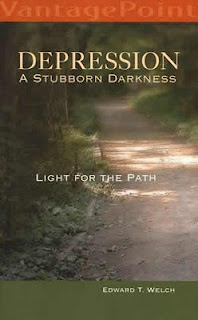 Depression: A Stubborn Darkness
Depression: A Stubborn Darknessby Edward T. Welch
“When you are depressed, how can you take a step, let alone a journey? When all vital energy is devoted to staying alive and just making it to the next hour, how can you add anything else – like hope – to your day?” So begins this wise and compassionate book by Ed Welch. Whether you are a someone who struggles with depression yourself, or someone who desires to help those who do, Depression: A Stubborn Darkness
The book is divided into an introduction and four parts.
Introduction
The first three chapters are introductory and begin with an empathetic note, describing “How Depression Feels” (chapter two) with a number of actual statements from those who have experienced depression. This chapter will help give understanding to someone who has never personally battled with severe depression. “Definitions and Causes” are described in chapter three, which differentiates between “situational depression” (less severe) and “clinical depression” (more severe), along with lists of possible symptoms for each.
Part One: Depression is Suffering
The seven chapters making up part one are Godward and hopeful, reminding us that depression is a form of suffering out of which we can cry out to God for comfort and purpose. Welch doesn’t try to make depression look less painful than it is. He faces it head-on. But neither does he let the lying voices of depression claim the day. Instead, he points the reader to God and Scripture (especially the Psalms), with gentle and hopeful reminders of God’s love and sovereignty.
Part Two: Listen to Depression
Part two is especially helpful as the various contributing causes of depression are explored. These include other people, “Adam,” Satan (chapter eleven), and culture (chapter twelve). Chapter thirteen gets to “The Heart of Depression” showing that depression is a result not simply of the “outside events” that “come at us,” but also our “internal believes and interpretations . . . that come out of us” (p. 123). To deal with depression we must learn to address the “spiritual allegiances” of our hearts” which give rise to imaginations, desires, motives, thoughts, feelings, and actions. “The curious path to true life” says Welch, “is to grow in both the knowledge of God’s love and your own sin” (p. 131). Chapter fourteen continues with “The Heart Unveiled,” with following chapters exploring other causes of and collaborators with depression such as fear, anger, dashed hopes, failure and shame, guilt and legalism, and death. With each of these, the author walks the reader through the fog of confused feelings onto the sure-footed path of biblical truth about sin and grace.
Part Three: Other Help and Advice
In part three, Welch discusses medical treatments (chapter twenty-one) and gives helpful advice for the families and friends of those who are suffering from depression (chapter twenty-two). “To help a depressed person, you don’t need expert knowledge. You do need an awareness of your own spiritual neediness, a growing knowledge of Jesus, and an eagerness to learn from others, including the person you would like to help” (p. 224). A particularly great chapter follows called “What Has Helped.” It contains helpful insights from counselees about what first helped them begin to change, along with some specific strategies to try. The goal of the chapter is not to give an endless to-do list, but rather to “prime the pump” by giving ideas and strategies that have actually been helpful for depressed people. Chapter twenty-four is another honest, yet hopeful, look at “What to Expect” as one continues to battle against depression.
Part Four: Hope and Joy: Thinking God’s Thoughts
The book finishes with two chapters on: Humility and Hope (chapter twenty-five) and Thankfulness and Joy (chapter twenty-six). Potential readers should not feel daunted by the twenty-six chapters; each chapter is short and Ed Welch is an engaging writer with an easy prose. It is obvious that Welch has done his research, but the book isn’t cluttered by clinical language. More than anything, reading this book feels like getting good advice from a kind and caring friend. As a pastor who occasionally struggles with discouragement and sometimes counsels those with more severe forms of depression, I found this a grace-filled book, loaded with hope and wisdom. I highly recommend it.

No comments:
Post a Comment